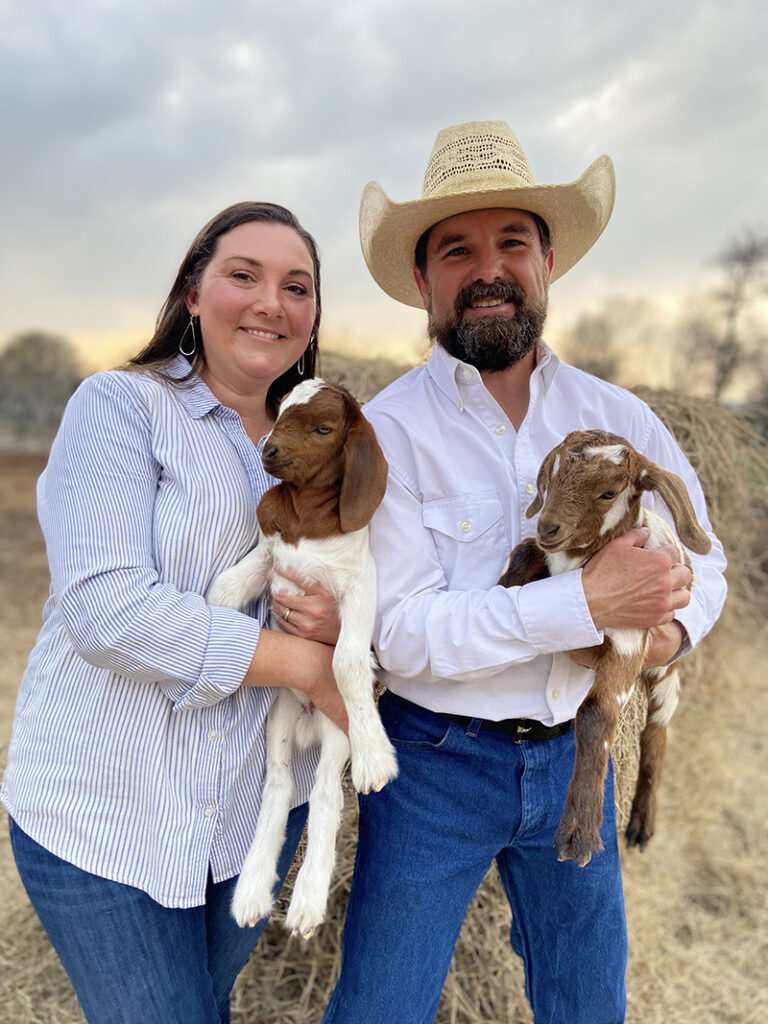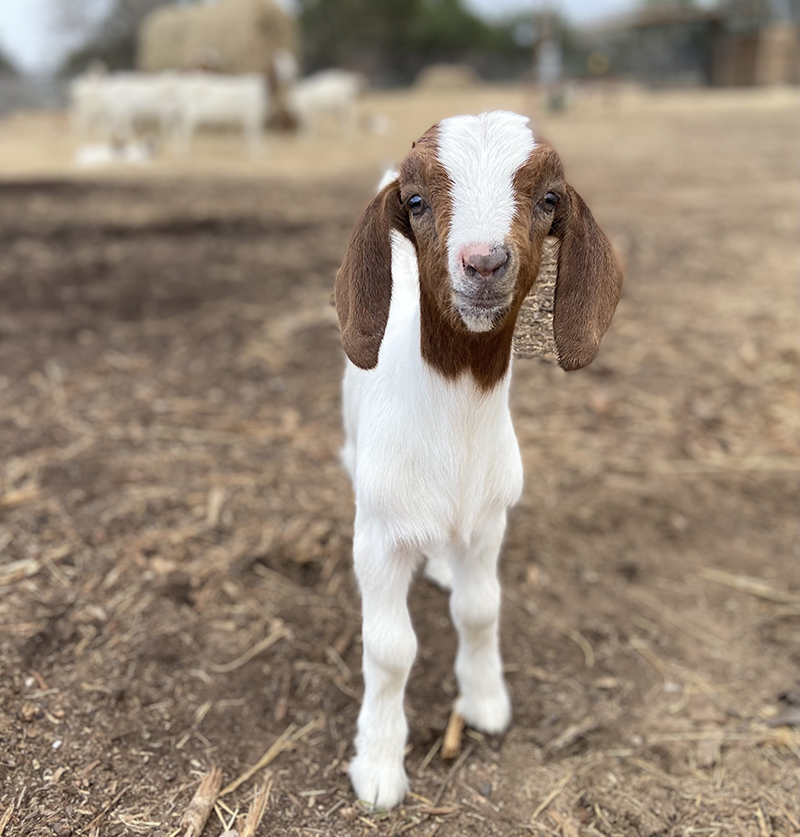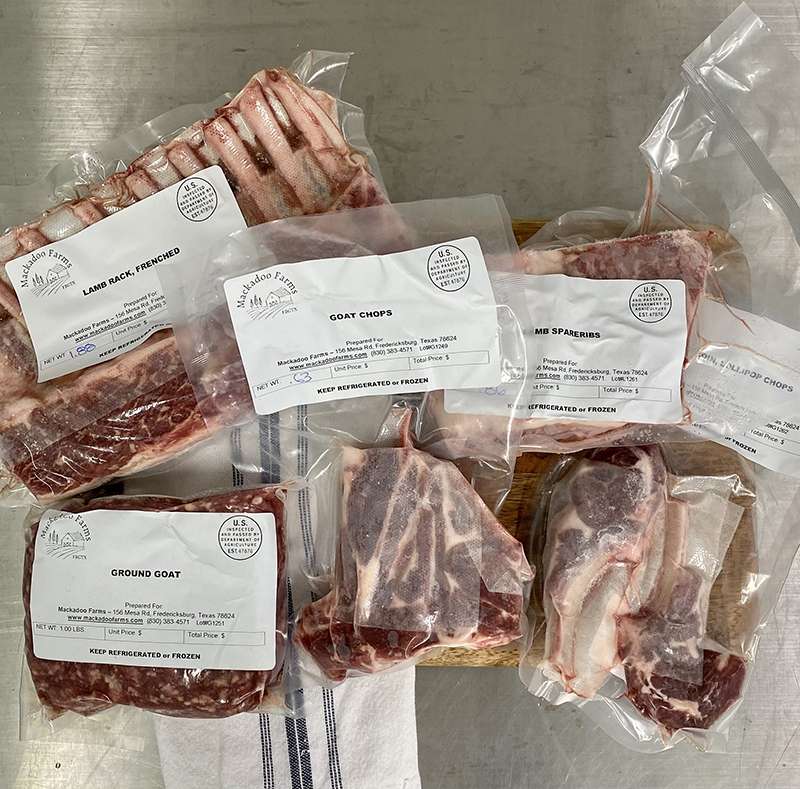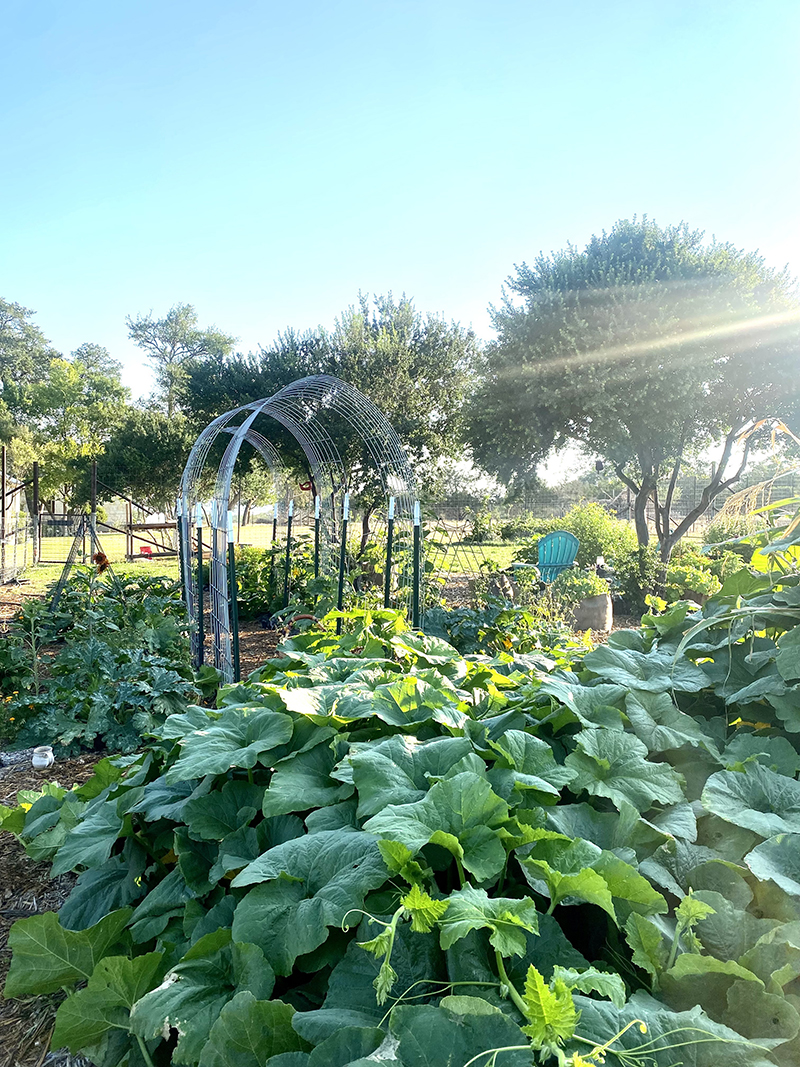When you visit Mackadoo Farms, David and Leslie Morgan will have time for you. In fact, time seems to slow once you pull onto the property, off Highway 16 South. It’s not the breezy tempo of a vacation — no sleeping late when there are animals to take care of and plants to tend and spices to blend. It’s work, but the Morgans have intentionally built slowness into their daily routine.
“We got rid of our Keurig. Now we do French press. I intentionally don’t have a dishwasher. I have not replaced our microwave that broke. I wanted a clothesline for Christmas,” Leslie said. “We do intentional small things that take more time because it makes us live life a little slower.”

David says that focus has benefited the entire family.
“It gives you time to consider what you’re doing, what you’re gonna do tomorrow. In the city you’re just running all the time, never slow down, never have time to think and contemplate,” he said.
The Morgans were living a typical, super-busy suburban life in Austin when the pandemic hit. The someday-plans they had to eventually move to Fredericksburg got stepped up. After a car-shopping trip David took through town with their daughter, she got on board with the idea of going country.
“She said, ‘This is a cute town! No wonder Mom loves this place. I could live here! Do they have schools here?’ I told her, ‘Yes, they use textbooks and everything,’” David said. “As a family we made the decision final that day.”
After their moved to the 25 acres they now call home, the Morgans decided to invest in small ruminants — Dorper sheep and Boer goats, breeds that do well on native grass and forage. Using temporary paddocks for rotational grazing, David and Leslie are rejuvenating the land as they rejuvenate their lives.
“One of our goals with this farm and bringing our kids out here is to live a God-honoring lifestyle and share that with others. Not to get off the grid, but to be more self-sufficient,” Leslie said.
She chronicles the family’s journey at mackadoofarms.com, which includes a blog with this introduction: “This is us. Here you will see plenty of failures as we learn, and some lessons learned along the way. We’re so glad you’re here to learn with us and hope you stick around!”
The blog grew out of Leslie’s posts on social media, and it has blossomed into garden coaching.
“When I posted on social media I was getting a lot of questions, so I thought maybe I should start charging for this,” she said.
One coaching client was a gardener from Chicago who had no idea how to garden in Texas, where, as David quipped, “There’s rocky soil, and it doesn’t rain sometimes.”
Leslie spent a couple of hours with the man, providing guidance of how and when to plant down here. She Facetimed with another client, who digitally walked her through the garden.

“I showed her how to get rid of bugs without using chemicals,” Leslie said.
New gardeners often ask how to get rid of all the bugs in the garden. “Bugs are good — some bugs are good,” Leslie said. “Leave the ladybugs.”
She calls their country life “urban homesteading.” Both of Leslie’s parents were Master Gardeners, so she’d always grown up with some homegrown food. Now, using deep mulch gardening, she can grow so much more. But her garden is not a market garden. It provides food for the family and the animals, plus a little leftover to sell.
“You don’t have to buy all your fruit from farms in California when there’s all this produce in the Hill Country to purchase and so much you can grow in your own backyard,” she said. “We like to tell people, ‘Go to your local farmers market. Look for your local farmers and ranchers and reach out to them. Pick two to three fruits or vegetables your family loves and grow them. Almost everybody can grow squash or tomatoes or potatoes. If you like strawberries, try those.’”
Leslie’s garden looks more like a landscape garden because it’s a mixture of fruit trees, vegetables, and flowers. She believes in the value of companion plants, like marigolds, nasturtium, and garlic, that feed the soil and help deter bad bugs while attracting the good ones.
Mackadoo’s Farm Shop, open Tuesday and Thursday from 10 a.m. to 2 p.m. by appointment, carries the Morgan’s lamb and goat meat. Knowing many people are unfamiliar with these meats, the Morgans are hands on with customers, talking through cooking ideas.
“The most common question we get is, ‘How do you cook it? We lay out cuts of meat based on how they want to cook: grilling, pressure cooker, roasting,” David said. “I like the challenge of trying to get people — I’m not gonna convert a vegan — but to get people who eat beef and chicken to try something new. When you say, ‘How was it?’ And they say, ‘It was amazing! It was delicious!’ You can’t put a price on that.”
Mackadoo Farms offers Frenched rack, lamb chops, ground goat and lamb, leg of lamb, spareribs, shoulder roast, blade chops, and leg steak. For the adventurous, an organ grind is available. They also sell lamb bones for making bone broth or to give to dogs.
In addition, the Farm Shop sells handcrafted coffee mugs from Mud Dauber Pottery, an Everyday Spice Blend Leslie makes herself — “good on any type of protein and on potatoes,” she said — and a DIY elderberry syrup blend.
“It boosts the immune system. We take it all winter. There’s no sugar. You add honey — local honey helps with allergies anyway,” she said.
Leslie enjoys experimenting with making things herself. “It just doesn’t make sense to me that I have to buy everything from the store. My great-grandmother and grandmother didn’t,” she said.

“Nobody’s did,” David added.
Soon Mackadoo Farms will add duck eggs and sheep tallow to their offerings. “Tallow — you can cook with it. It’s also in lotions,” Leslie said. “It’s a healthier fat than seed oil and also can take high temperatures.”
The spice blend and elderberry kit are available by subscription. The Morgans hope to expand the subscription service to include meat as well. For an additional fee, Mackadoo Farms will deliver in Fredericksburg.
Spring and early summer is their busiest time. That’s when the shelves are filled with surplus produce and flowers — at least the ones the goats don’t eat. “Goats love zinnia!” Leslie explained.
Farm tours also pick up in the spring and early summer. “People are fascinated to see it firsthand. We show them how to take care of goat kids, how to do regenerative gardening,” David said.
This year the Morgans plan to get their meat into more stores and restaurants, to bring more folks to their farm store, and to participate in more farmers markets. Currently they are at Fredericksburg Farmers Market, Farmers Market at Herff Farm in Boerne, and Johnson City Farmers Market.
They also want to encourage and educate other families who are curious about becoming more self-sufficient when it comes to food.
“If we can be some type of resource, example, inspiration, that you don’t have to know everything, and you don’t have to do everything to get started,” David said. “All you have to do is have an interest in it.”
Mackadoo Farms
mackadoofarms.com
(830) 383-4571


